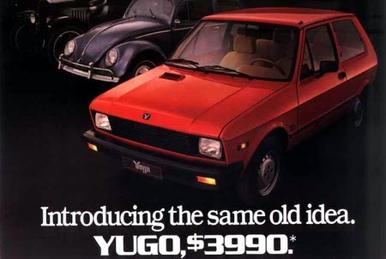
The Yugo, also known as the Zastava Koral, is a small economy car that gained notoriety as one of the cheapest and most basic cars ever produced. Its history is intertwined with the economic and political landscape of Yugoslavia, the country where it was manufactured. While it first launched in 1980, it was on August 24, 1985 that the Yugo GV went on sale in the United States.
Development of the Yugo
The origins of the Yugo trace back to the 1970s in Yugoslavia, a country that was under the leadership of President Josip Broz Tito at the time. The Yugoslav government aimed to develop a domestically produced car that would be affordable for the general population and reduce dependence on imported vehicles. In 1978, the Zastava Automobile factory in the city of Kragujevac began production of the Zastava Koral, later to be known as the Yugo.

Design and Features: The Yugo was designed as a compact, budget-friendly car with simple and functional features. It was available in various body styles, including a hatchback, sedan, and even a convertible. The design was based on the older Fiat 127, and many of the Yugo’s components were borrowed from Fiat’s parts bin.
Export to Western Markets: During the 1980s, Zastava began exporting the Yugo to Western markets, particularly to the United States and Canada. The Yugo’s low price tag made it attractive to cost-conscious consumers, but its low quality and reliability issues soon became apparent. The Yugo’s reputation in these markets suffered due to its poor build quality, frequent breakdowns, and safety concerns. The car’s lackluster performance and outdated design also contributed to its negative image.
The Yugo is discontinued
As Yugoslavia faced political and economic turmoil in the late 1980s, the quality of the Yugo deteriorated further. Economic sanctions, internal conflicts, and the eventual dissolution of Yugoslavia had a negative impact on Zastava’s ability to maintain production standards. The Yugo’s reputation for being a cheap and unreliable car was firmly established, and it became the butt of many jokes and a symbol of subpar manufacturing.

Legacy: Despite its shortcomings, the Yugo remains an iconic and somewhat nostalgic symbol of an era. The car’s notoriety has led to it being referenced in popular culture, often as a punchline. However, it’s worth noting that the Yugo was not entirely without its merits; it was indeed an affordable option for many people, and some loyal owners have shared positive experiences.
End of Production: The production of the Yugo came to an end in the early 2000s. Zastava faced financial difficulties and struggled to meet modern safety and emissions standards. The company rebranded itself as Zastava Automobiles and produced a few more models before ultimately shutting down car production in 2008. In total 794,428 Yugos left the factory.
In retrospect, the Yugo’s history serves as a cautionary tale about the challenges of producing a low-cost car without compromising on quality. While it may not have been a commercial success in terms of reliability or reputation, the Yugo undeniably left an indelible mark on the automotive industry and popular culture.





















